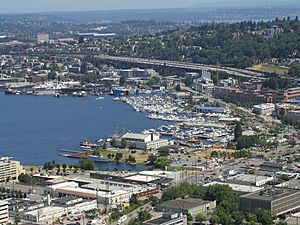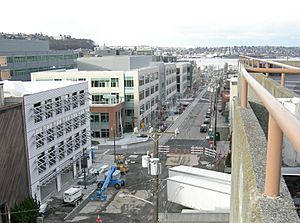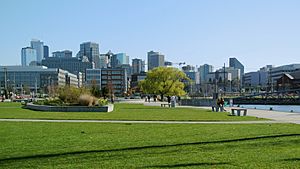South Lake Union, Seattle facts for kids
Quick facts for kids
South Lake Union, Seattle
|
|
|---|---|
|
Seattle Neighborhood
|
|
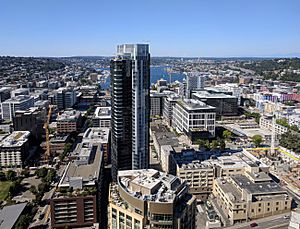
South Lake Union neighborhood, viewed from south of Denny Way
|
|
| Nicknames:
SLU
|
|
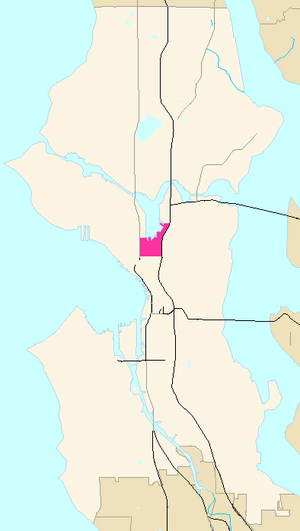
South Lake Union Highlighted in Pink
|
|
| Country | United States |
| State | Washington |
| County | King |
| City | Seattle |
| Zip Code |
98109
|
| Area Code | 206 |
South Lake Union (often called SLU) is a lively neighborhood in Seattle, Washington. It gets its name because it's located at the southern tip of Lake Union.
The neighborhood's official borders are Denny Way to the south, Interstate 5 to the east, and Aurora Avenue N. and 7th Avenue N. to the west. To the north, it's bordered by Lake Union itself. Like many Seattle neighborhoods, its exact edges can be a bit blurry. For example, some buildings often thought of as South Lake Union are officially in the Denny Triangle. A part of South Lake Union, east of Fairview Avenue N., is historically known as Cascade. Many old buildings still stand there today.
The main roads here include Valley and Mercer Streets (running east-west) and Dexter, 9th, Westlake, and Fairview Avenues N. and Eastlake Avenue E. (running north-south). The city has worked to improve traffic by making Mercer Street a wider, two-way road. Valley Street is now more friendly for people walking.
Contents
Exploring South Lake Union's Past
Early Days: The 1800s
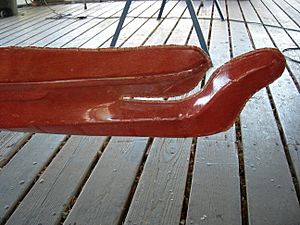
Long ago, Lake Union was known by Native Americans as Tenass Chuck, meaning "little water." This was to tell it apart from Lake Washington, which was "big water." When the first white settlers arrived in the 1850s, Native American groups, likely the Duwamish people, lived near the lake. They had trails leading to Elliott Bay and hunted deer and elk. They also gathered fish, clams, and berries for food. Native American settlements in this area continued until 1875.
A pioneer named David Denny claimed land here in 1853. His land stretched from South Lake Union down to what is now Denny Way. In 1882, a large sawmill opened on the lake's south shore. Denny bought it in 1884 and renamed it the Western Mill. He cleared the land and even dug a channel to Lake Washington. This allowed logs to float from the larger lake directly to his mill.
Denny ran the mill until 1895. Many of his workers and their families lived nearby. Other mills also opened in the area. The lake also became important for transporting coal. Coal was brought from Issaquah to Lake Washington, then by wagon to Lake Union. From there, it went to downtown Seattle. At first, a narrow-gauge railroad carried the coal, but it was later replaced by wagons.
Growth and Change: The 1900s
After David Denny's business faced problems in 1895, the mill continued to operate under new owners until the 1920s. The last part of the mill business closed in 1988. Around the turn of the century, more factories started to appear. These included places that made furniture and, later, ships. Bill Boeing even built his first airplane factory here, making seaplanes.
Other important buildings from this time include Seattle City Light's Hydro House (1912) and the Lake Union Steam Plant (1914). The first Ford Model T assembly plant west of the Mississippi River also opened here in 1914. Both the old steam plant and the Ford building are now considered historic landmarks. The steam plant now holds a company called Zymogenetics, and the Ford building is used for storage. A railroad line also ran around Lake Union, with a freight station opening in 1913.
As businesses grew, more homes were built for workers. The Cascade neighborhood was a key residential area. People from Russia, Sweden, Norway, and Greece settled there. The Cascade School, built in 1894, was at the heart of this community. Over time, South Lake Union became less about homes and more about small businesses and warehouses. The Cascade neighborhood slowly lost its separate identity, especially after Interstate 5 was built, cutting it off from Capitol Hill.
In 1917, the Lake Washington Ship Canal opened. This connected Lake Union to both Lake Washington and Puget Sound, which leads to the Pacific Ocean. This was a big boost for industry and business. Many old buildings from this time, made of wood frames with brick walls, still stand. The area also had many car dealerships and large laundries. The Seattle Times Building was built here in 1930.
In the early 1990s, a newspaper columnist suggested turning the area into a large park, like New York's Central Park. This idea was called the Seattle Commons. It also included plans for homes and shops around the park. Microsoft co-founder Paul Allen gave $20 million to buy land for the project. However, the public voted against the plan in 1995 and 1996, so the land went back to Paul Allen.
South Lake Union Today: The 2000s
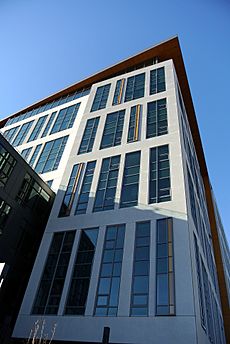
Today, only a few old homes and factories in the historic Cascade Neighborhood are still used for their original purpose. The historic Immanuel Lutheran Church and Saint Spiridon Orthodox Cathedral are still here. The REI flagship store, the headquarters of PEMCO, and the Fred Hutchinson Cancer Research Center are also in this area.
In other parts of South Lake Union, many old buildings remain, but they have new uses. In April 2008, the new Lake Union Park opened. It has a bridge, a waterfront walkway, and lots of green space. The park was fully finished in 2010. It has a dock for historic boats like the steamer Virginia V and the fireboat Duwamish. The Maritime Heritage Center also offers fun activities.
In 2007, Amazon announced it would bring its Seattle offices to South Lake Union. They started moving in during 2010. The Museum of History & Industry (MOHAI) also moved to the neighborhood in 2012, into a building that used to be a Naval Reserve Training Center. South Lake Union is also home to Denny Park, which is Seattle's oldest park.

South Lake Union: A Hub for Science and Health
South Lake Union is becoming a major center for life science organizations. These are groups that study living things, like plants, animals, and humans, to improve health and solve problems. This growth is partly thanks to development plans by Paul Allen's company, Vulcan Inc..
Some of the important science and health groups here include:
- Fred Hutchinson Cancer Research Center (which studies cancer)
- Allen Institute for Brain Science (which studies the brain)
- Allen Institute for Cell Science (which studies cells)
- Seattle Children's Hospital (which helps kids get well)
- University of Washington Medicine (part of the university's medical school)
The University of Washington School of Medicine has a large campus here with many researchers and staff. They work on different areas like allergies, heart health, and women's health.
The idea of building a big science hub here has caused some discussion. Some people worried that new, expensive buildings would replace affordable homes. However, groups like the Low-Income Housing Institute have built new affordable housing in the area. Some new apartment buildings also set aside a certain number of units for people with lower incomes.
In 2007, the South Lake Union Streetcar started running. It connects the neighborhood to downtown Seattle, making it easier for people to get around.
Homes in South Lake Union
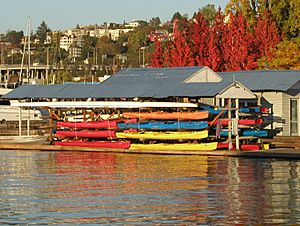
In Seattle's early days, South Lake Union had homes for both mill workers and owners, including David Denny himself. By the 1960s, much of the housing was torn down for parking lots. This left the Cascade Neighborhood as one of the few places with many homes.
In 1972, a city group suggested building thousands of new apartments in South Lake Union and Belltown. Since 2003, when the city started a plan to redevelop the area, South Lake Union has seen a big increase in housing. Thousands of new homes have been built or are planned. While most of these are market-rate (meaning they cost the usual price), groups working for affordable housing have made sure that many units are available for people with lower incomes or those who have experienced homelessness.
South Lake Union's Economy
South Lake Union is a major business center. Jones Soda Company used to have its main office here. Now, Amazon has a huge presence, with over 25 buildings and thousands of employees in its South Lake Union campus. They also have more offices in the nearby Denny Triangle.
In 2012, Amazon announced it would buy its South Lake Union headquarters from Paul Allen's company for over $1 billion. This was a very high price for office space in Seattle at the time. In the 2010s, other big tech companies like Google and Facebook also opened offices in South Lake Union, making it a key area for technology and business.
Green Spaces to Enjoy
South Lake Union has several parks and green areas where people can relax and play:
- Denny Park
- Cascade Playground
- Lake Union Park
- Northwest Seaport
- Center for Wooden Boats
Historic Places and Landmarks
Many buildings and structures in South Lake Union are recognized as important historic landmarks. Some of these are in the Cascade neighborhood, which was once a separate community.
| Building or structure |
Address | Listing | Photo |
|---|---|---|---|
| Tugboat Arthur Foss | Officially listed in Kirkland, Washington but now docks at Northwest Seaport, Lake Union Park |
NRHP |  |
| Excursion Boat Virginia V | Docks at Northwest Seaport, Lake Union Park | Seattle landmark NRHP |
 |
| Fireboat Duwamish | Docks at Northwest Seaport, Lake Union Park | Seattle landmark NRHP |
 |
| Lightship Relief / Swiftsure | Docks at Northwest Seaport, Lake Union Park | Seattle landmark |NRHP |
 |
| Pacific McKay and Ford McKay buildings | 601-15 Westlake Ave. N | Seattle landmark |  |
| R-class sloop Pirate | Docks at Center for Wooden Boats | NRHP | |
| Schooner Wawona No longer seaworthy |
Dismantled in 2009. | Seattle landmark NRHP |
 |
| Seattle First National Bank Building | 566 Denny Way | Seattle landmark |  |
| Seattle Times Building | 1120 John St. | Seattle landmark |  |
| Troy Laundry Building As of 2008, used by the Seattle Times as a warehouse |
311–329 Fairview Ave. N | Seattle landmark |  |
| Van Vorst Building | 413–421 Boren Ave. N | Seattle landmark |  |
| West Earth Co. Street Clock | 406 Dexter Ave. N | Seattle landmark | |
| William Volker Building Now part of Cornish College of the Arts |
1000 Lenora Street | NRHP |  |
| Schooner Zodiac | Home port is now in Bellingham, Washington, but often docks at the Center for Wooden Boats |
NRHP |  |
Raisbeck Performance Hall, which used to be a Sons of Norway hall, is now part of Cornish College of the Arts. It's just south of Denny Way, near the William Volker Building (listed above), which is also part of Cornish. This means it's officially just outside the South Lake Union neighborhood.
| Building or structure |
Address | Listing | Photo |
|---|---|---|---|
| Old Norway Hall Now Raisbeck Performance Hall |
2015 Boren Ave. | Seattle landmark | |
| Naval Reserve Armory (Museum of History and Industry since 2013) |
800 Terry Ave. N. | Seattle landmark |  |


